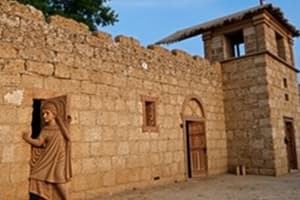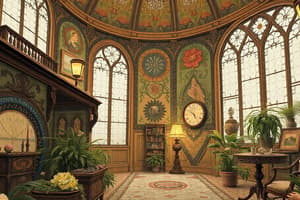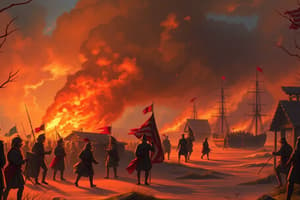Podcast
Questions and Answers
What reflects the contradictory trends of American identity in the mid-eighteenth century?
What reflects the contradictory trends of American identity in the mid-eighteenth century?
- Strengthening of English culture and authority
- Both A and C (correct)
- Integration and autonomy occurring simultaneously
- Rise of authoritarian characteristics
What does 'Culture' refer to in the context of the American colonies?
What does 'Culture' refer to in the context of the American colonies?
Cultural streams from continued immigration, particularly in religion.
What was a significant demographic change in the American colonies by the end of the seventeenth century?
What was a significant demographic change in the American colonies by the end of the seventeenth century?
- Decline of Scottish and Irish immigrants
- Increase in indentured servants
- Increase of black laborers from Africa and the Caribbean (correct)
- Decrease in population due to diseases
The Southern colonies depended on immigration to grow until the eighteenth century.
The Southern colonies depended on immigration to grow until the eighteenth century.
What economic transformations occurred in the American colonies?
What economic transformations occurred in the American colonies?
Religion played a minimal role in people's lives in the American colonies.
Religion played a minimal role in people's lives in the American colonies.
What characterized the slave culture that developed in North America?
What characterized the slave culture that developed in North America?
What are Slave Codes?
What are Slave Codes?
Who were the Huguenots?
Who were the Huguenots?
What contributions did the Middle Colonies make to the economy?
What contributions did the Middle Colonies make to the economy?
What does the term 'Mulatto' refer to?
What does the term 'Mulatto' refer to?
What was the Stono Rebellion?
What was the Stono Rebellion?
What does 'Primogeniture' mean?
What does 'Primogeniture' mean?
What are 'Jeremiads'?
What are 'Jeremiads'?
What was 'The Great Awakening'?
What was 'The Great Awakening'?
Who was Jonathan Edwards?
Who was Jonathan Edwards?
Match the following terms with their definitions:
Match the following terms with their definitions:
What did Benjamin Franklin publish?
What did Benjamin Franklin publish?
Flashcards are hidden until you start studying
Study Notes
American Identity
- Colonists fled to America for economic, political, and religious reasons.
- Migrants often shared antiauthoritarian views, forming communities of like-minded individuals.
- English cultural influence and royal authority were both increasing in the colonies.
- A simultaneous sense of autonomy and integration characterized colonial life.
Culture
- Immigration led to diverse cultural influences, especially in religion, creating new denominations.
- Puritan New England prioritized education more than southern colonies.
- Cambridge, home to the first American college, was a center of learning and scientific inquiry.
- The Massachusetts School Act of 1647 mandated public education for white Americans.
Demographic Changes
- Immigrant influx to American colonies surged by the late seventeenth century.
- Economic hardships in Europe drove German, French, and Scot-Irish immigrants to the colonies.
- The number of black laborers increased significantly, replacing declining indentured servant numbers.
- Northern colonies experienced decreasing mortality rates leading to natural population growth by the mid-seventeenth century.
- American non-Indian population doubled every twenty-five years.
Economic Transformations
- Colonial economy transitioned from survival-based to a thriving consumer culture.
- Agriculture dominated the economy; rice and indigo became significant crops in the Carolinas.
- New England shipbuilding flourished due to the Navigation Acts and abundant water resources.
- Middle colonies' commercial farming supplied food to New England, the Caribbean, and Europe.
- The Atlantic trading network evolved, often referred to as the triangular trade.
Religion
- Religious experience varied significantly across regions, influencing social conditions.
- The Anglican Church had a notable presence in Virginia but was less dominant elsewhere.
- Conflicts between Catholics and Protestants in Chesapeake Maryland lessened in the late 17th century.
- In New England, concerns about religious decline prompted responses including witch hunts and the Great Awakening.
Slavery and Its Legacies in North America
- The black population developed a unique culture blending African and European traditions.
- Extended kin networks emerged to support families separated by slavery.
- Religion offered solace and a sense of hope for freedom beyond the earthly life.
- Distinct languages developed among slaves, reflecting cultural adaptations.
Slave Codes
- Legal frameworks emerged reinforcing white supremacy and controlling enslaved populations.
Huguenots
- Refers to French Protestants who fled persecution in France for religious freedom.
Economics of the Middle Colonies
- The region supported commercial farming, leading to growth in home industries and craft enterprises.
- Shipbuilding thrived alongside early ironworks in locations like Massachusetts, New Jersey, and Pennsylvania.
- The Navigation Acts, including the Iron Act, imposed restrictions on industries.
Mulatto
- Refers to mixed-race children, typically born from unions between slave masters and enslaved women.
- While frowned upon, these individuals often worked in domestic settings.
Stono Rebellion
- A significant slave uprising in South Carolina where enslaved individuals killed numerous whites.
Primogeniture
- A system where the firstborn son inherits the entirety of the family estate.
Jeremiads
- Puritan leaders who preached against sin and sought to inspire repentance among their communities.
The Great Awakening
- A religious revival movement in the 1730s and 1740s aiming to revitalize the faith and participation in church life.
- Itinerant evangelists spread messages of personal salvation and grace for all.
Jonathan Edwards
- A prominent preacher known for emphasizing God's sovereignty and opposing the concept of easy salvation.
New Lights and Old Lights
- Divisions within congregations that led to the creation of new churches, reflecting differences in religious thought.
Benjamin Franklin
- Renowned for publishing a popular almanac; considered America's most famous scientist due to his work with lightning and electricity.
Studying That Suits You
Use AI to generate personalized quizzes and flashcards to suit your learning preferences.



